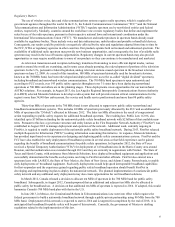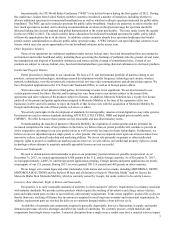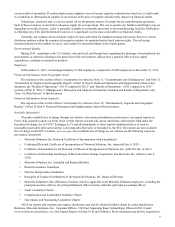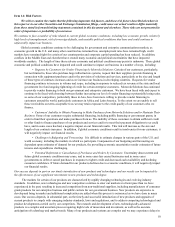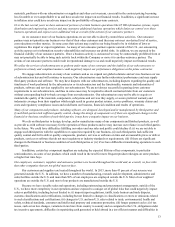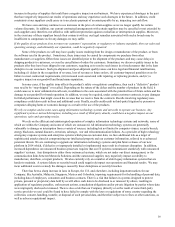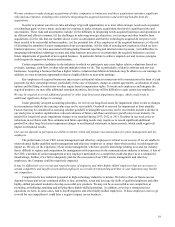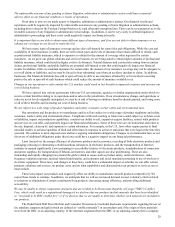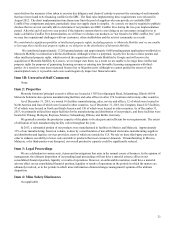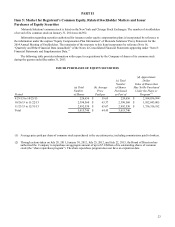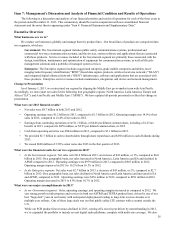Motorola 2013 Annual Report Download - page 18
Download and view the complete annual report
Please find page 18 of the 2013 Motorola annual report below. You can navigate through the pages in the report by either clicking on the pages listed below, or by using the keyword search tool below to find specific information within the annual report.16
increase in the price of supplies that could have a negative impact on our business. We have experienced shortages in the past
that have negatively impacted our results of operations and may experience such shortages in the future. In addition, credit
constraints at our suppliers could cause us to accelerate payment of accounts payable by us, impacting our cash flow.
We have seen and may continue to see increases in the price of certain supplies as we no longer qualify for certain
volume discounts. In addition, our current contractual arrangements with certain suppliers may be cancelled or not extended by
such suppliers and, therefore, not afford us with sufficient protection against a reduction or interruption in supplies. Moreover,
in the event any of these suppliers breach their contracts with us, our legal remedies associated with such a breach may be
insufficient to compensate us for any damages we may suffer.
If the quality of our products does not meet our customers' expectations or regulatory or industry standards, then our sales and
operating earnings, and ultimately our reputation, could be negatively impacted.
Some of the products we sell may have quality issues resulting from the design or manufacture of the product, or from
the software used in the product. Sometimes, these issues may be caused by components we purchase from other
manufacturers or suppliers. Often these issues are identified prior to the shipment of the products and may cause delays in
shipping products to customers, or even the cancellation of orders by customers. Sometimes, we discover quality issues in the
products after they have been shipped to our customers, requiring us to resolve such issues in a timely manner that is the least
disruptive to our customers. Such pre-shipment and post-shipment quality issues can have legal and financial ramifications,
including: (i) delays in the recognition of revenue, loss of revenue or future orders, (ii) customer-imposed penalties on us for
failure to meet contractual requirements, (iii) increased costs associated with repairing or replacing products, and (iv) a
negative impact on our goodwill and brand name reputation.
In some cases, if the quality issue affects the product's safety or regulatory compliance, then such a “defective” product
may need to be “stop-shipped” or recalled. Depending on the nature of the defect and the number of products in the field, it
could cause us to incur substantial recall costs, in addition to the costs associated with the potential loss of future orders and the
damage to our goodwill or brand reputation. In addition, we may be required, under certain customer contracts, to pay damages
for failed performance that might exceed the revenue that we receive from the contracts. Recalls involving regulatory non-
compliance could also result in fines and additional costs. Finally, recalls could result in third-party litigation by persons or
companies alleging harm or economic damage as a result or the use of the products.
We rely on complex and in some cases aging information technology systems and networks to operate our business. Any
significant system or network disruption, including as a result of third-party attacks, could have a negative impact on our
operations, sales and operating results.
We rely on the efficient and uninterrupted operation of complex information technology systems and networks, some of
which are within the Company and some of which are outsourced. All information technology systems are potentially
vulnerable to damage or interruption from a variety of sources, including but not limited to computer viruses, security breach,
energy blackouts, natural disasters, terrorism, sabotage, war and telecommunication failures. As a provider of high technology
emergency response systems and enterprise systems which process customer data, we face additional risk as a target of
sophisticated attacks aimed at compromising our intellectual property and our customer information, referred to as advanced
persistent threats. We are continuing to upgrade our information technology systems and plan future releases of our new
platform in 2014 which, if defective or improperly installed or implemented may result in a business disruption. In addition,
increased dependence on outsourced business processes requires that our IT systems communicate seamlessly with outsourced
suppliers’ systems. Any disruption to either those outsourced systems, which are not under our direct management, or the
communication links between Motorola Solutions and the outsourced supplier, may negatively impact our ability to
manufacture, distribute, or repair products. We also currently rely on a number of older legacy information systems that are
harder to maintain. A system failure or security breach could negatively impact our operations and financial results. We may
incur additional costs to remedy the damages caused by these disruptions or security breaches.
There has been a sharp increase in laws in Europe, the U.S. and elsewhere, including important markets for our
Company, like Australia, Malaysia, Singapore, Mexico and Colombia, imposing requirements for the handling of personal data,
including data of employees, consumers and business contacts. There is a risk that failures in systems designed to protect
private, personal or proprietary data held by us will allow such data to be disclosed to or misused by others, resulting in
application of regulatory penalties, enforcement actions, remediation obligations and/or private litigation by parties whose data
were improperly disclosed or misused. There is also a risk that our Company (directly or as the result of some third-party
service provider we use) could be found to have failed to comply with the laws or regulations of some country regarding the
collection, consent, handling, transfer, or disposal of such personal data, and therefore subject us to fines or other sanctions, as
well as adverse reputational impact.


